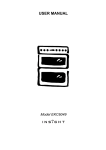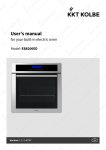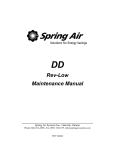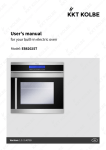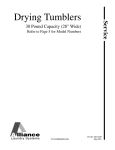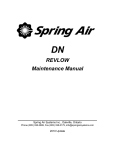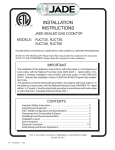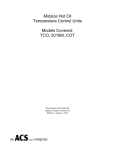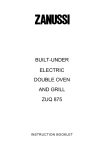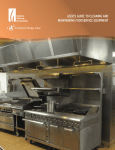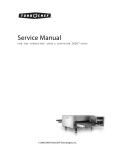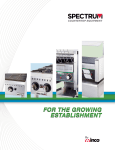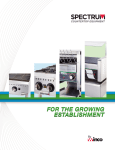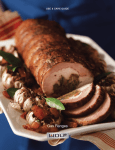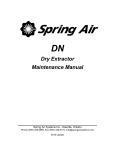Download Residential Jade User Manual
Transcript
Residential Jade User Manual WARNINGS AND NOTICES General Safety Requirements 1. Proper installation is vital to the safe and satisfactory operation of your Jade Range. In the USA, installations should be made in accordance with state and local codes and National Gas Fuel Code ANSI-Z223.1. In Canada, installation should be made in accordance with CAN/CGA-B149.1 and CAN/CGA-B149.2 "Installation Code for Gas Burning Appliances and Equipment", CSA Standard C22.1-"Canadian Electrical Code Part 1", and local codes. 2. Installation of appliances designed for manufactured (mobile) home installation must conform with the Manufactured Home Construction and Safety Standard, Title 24 CFR, Part 3280 [formerly the Federal Standard for Mobile Home Construction and Safety, Title 24, HUD (Part 280)] or, when such standard is not applicable, the Standard for Manufactured Home Installations, ANSI A225.1 and Manufactured Home Installations, Sites, and Communities ANSI/NFPA 501A, or with local codes. 3. If an external electrical source is utilized, the appliance, when installed, must be electrically grounded in accordance with local codes or, in the absence of local codes, with the National Electrical Code, ANSI/NFPA 70. safety WARNING: If the information in this manual is not followed exactly, a fire or explosion may result causing property damage, personal injury or death. - Do not store or use gasoline or other flammable vapors and liquids in the vicinity of this or any other appliance. - WHAT TO DO IF YOU SMELL GAS •Do not try to light any appliance. •Do not touch any electrical switch; do not use any phone in your building. •Immediately call your gas supplier from a neighbor's phone. Follow the gas supplier's instructions. •If you cannot reach your gas supplier, call the fire department. - Installation and service must be performed by a qualified installer, service agency or the gas supplier. 1 User Manual Gas Ranges and Cooktops SAFETY Warnings and Notices ..............................1 Safety Instructions .................................6-7 In the Event of a Power Failure ...............13 CLEANING & MAINTENANCE Standard Oven ..................................34-36 Convection Oven ...............................37-38 Infrared Broiler .......................................38 Exterior Surfaces ....................................39 STEPS TO FOLLOW Congratulations ........................................3 Special Features .......................................3 Model and Serial Number Location ........4-5 Complete and Return Warranty Card ........4 Warranty ..................................Back Cover OPERATION Features of Your Cooktop RJCT Series ...............................................8 Open Top and Wok Burners ..............40-41 Charbroiler .............................................42 Griddle ...................................................43 A Guide to the Perfect Flame Checking the Flame ...........................44-45 Lubricating the Oven Door ......................46 Replacing the Oven Bulbs .......................47 QUESTIONS Use this Easy Troubleshooting Guide .......................48-49 Features of Your Range RJGR Series ......................……...............11 Before Using Your Oven .........................12 Standard vs. Convection Oven ...........14-15 Standard Oven ........................16-17, 22-23 Convection Oven ....................18-19, 22-23 Infrared Broiling .......................20-21,24-25 Top Section Characteristics ....................26 Open Top Burners ..............................26-27 Wok .......................................................28 Charbroiler ........................................29-30 Griddle ..............................................31-33 2 SUPPORT Customer Service Before Calling for Service .......................51 Models: RJGR RJCT JADE SERIES Congratulations, You've Joined Our Family Of State-Of-The-Art Ranges And Discerning Owners Incorporating numerous components from a widely acclaimed line of Jade commercial ranges, with a host of technologically advanced home convenience features, your new Jade Range is designed to bring you countless years of satisfaction and pride. Jade offers its users the ability to create professional looking and tasting meals with relative ease, from the comfort and convenience of the home. steps to follow Equipped with numerous cooking, baking and broiling options, Jade Ranges afford tremendous flexibility in food creation and preparation. Jade broadens the capability of a home kitchen the instant it arrives. Jade Products Company, the manufacturer of Jade Ranges, is recognized as a leader in state-of-the-art ranges for the food service industry, as well as the home. Jade ranges and other appliances are the choice of gourmets across the nation. Thank you for joining our Jade Family. Special Features Distinguish Our Jade Ranges, And Promote Its Longevity. Built to perform to the highest standards, and endure for a generation, Jade Ranges are manufactured through welded construction of aluminized steel and stainless steel. Only the highest food grade, nonmagnetic stainless steel, Type #304, is used on our ranges. Many years of research and engineering have gone into the manufacture of your new Jade Range. Truly a professional quality appliance designed and manufactured for home applications, your Jade Range is equipped with special features not often found on residential ranges, or even on ordinary commercial ranges. Your new Jade Range has been constructed with extra care and attention to details: • Stainless steel gas tubing assures maximum safety and reliability. • Constructed of stainless steel, the open burners are equipped with electronic ignition, thus eliminating the need for pilot lights. • The wok burner features a conduction chamber specially designed to produce optimum heat. • The griddle operates with a U-shaped burner, which affords superior heat distribution. (Ordinary domestic griddles are equipped with a single straight tube burner.) • Jade charbroilers are simple to clean (unlike common charbroilers which use lava rocks or bricks that collect fat and grease). • Oven racks are fabricated of heavy gauge wire, welded and chrome plated with a "wraparound front" to prevent the scratching of cooking utensils. • The oven broiler features an infrared burner which glows instantly, radiating infrared heat within a few seconds of ignition. No preheating is necessary. • To eliminate glare, oven lamps are mounted on the sides, not on the rear of the ovens. • Oven interior is constructed of heavy gauge stainless steel. 3 CONSUMER INFORMATION steps to follow Keep handy for reference... This manual is intended to serve as a guide for the operation and maintenance of your new Jade Range. Please read it carefully, and keep it handy for reference. Locate the model and serial numbers. Your New Appliance model and serial numbers are included on a nameplate located under the cooktop area of the range (see illustration on page 5). Grates and grate supports must be removed in order to access the nameplate label. Refer to instructions on page 40. NOTE: When removing grates and grate supports, use care to avoid scratching stainless steel surfaces. Complete and return the warranty card. Please take a moment to fill out and mail the Warranty Card included with your Jade Range. Make sure you enter the model and serial numbers of your new appliance on the Warranty Card. For future reference, record the following information and refer to it when contacting the factory or an authorized service agent. 4 ____________________ _____________________ Model Number Serial Number ___________________________ Date Purchased ____________________________ Purchased From ___________________________ Installation Date ____________________________ Installed By ___________________________ Telephone Number RECORD MODEL AND SERIAL NUMBER – NAMEPLATE LABEL EASY TO FIND! steps to follow LABEL LOCATION RJCT SERIES LABEL LOCATION RJGR SERIES 5 SAFETY INSTRUCTIONS safety Please read before operating your new Jade Range General Precautions 1. Your Jade Range should be installed and grounded by a qualified technician. Ask the installer to show you where the gas shut-off valve is located, and how to operate it. 2. If the range is to be installed on an area covered with linoleum or any other flooring, make sure that the floor covering can withstand 90°F (65°C) above room temperature without warping, shrinking or discoloring. Do not install the range over carpeting. 10. Allow a minimum vertical distance of 30" between the range top surface and any combustible cabinets installed directly above the range. Overhead cabinets should be no more than 13" deep. 3. Be sure your range is correctly adjusted by a qualified service technician or installer for the type of gas (Natural or LP) on which it is to be used. Your range can be converted for either type of gas. Refer to the Installation Manual for instructions. 11. We recommend a clearance of 30" between the range top and the bottom of the ventilating hood. To confirm clearance distances and assure maximum performance, we recommend consulting the hood manufacturer. 4. If you smell gas, call a qualified service technician. Do not try to fix the problem yourself. Follow the instructions entitled "What To Do If You Smell Gas" on page 2. 12. The front of your range must remain clear of any obstruction. For proper operation and servicing, a free area of at least 36" in front of the range is recommended. 5. Caution: To prevent fire or smoke damage remove all packing materials from the range before operating it. 13. The area surrounding your Jade Range should be kept clean, and free from flammable liquids and other combustible materials such as mops, rags, brooms, etc., as well as solvents, cleaning fluids, and gasoline. 6. Before starting to cook, clean the range thoroughly with hot, soapy water. This is necessary to remove residuals and solvents used at the factory to clean and remove dirt, oil and grease which may have remained from the manufacturing process. The griddle plates should also be thoroughly cleaned. 6 9. Locate range out of the kitchen traffic path and out of drafty locations to prevent poor air circulation. It is important that neither the fresh air supply to the appliance, nor the flue opening is obstructed. Your kitchen must provide an adequate supply of fresh air to assure proper combustion and ventilation. 14. Caution: Do not attempt to operate the oven, griddle or infrared broiler during a power failure. Open top burners, the wok and the charbroiler can be lit manually, with a match. 7. In the event a burner goes out and gas escapes, turn off burner knobs, open a window or door and let the room air out. Do not attempt to use the appliance until the gas has had time to dissipate. 15. A risk of a tipover may exist if installation instructions - including those relating to excessive loading of the oven door, and abnormal use - are not followed. See installation manual. 8. Do not attempt to repair or replace any part of this appliance unless specifically recommended in this manual. Service should only be performed by a qualified technician. Warranty service must be performed by an authorized service agency. 16. Never line surface burners with tin foil. SAFETY INSTRUCTIONS (continued) Precautions Regarding Children 1. Never leave children unattended in the kitchen while the range is in use. 2. Do not store items of interest to children above the range; climbing to reach those items could cause serious injuries. 3. Do not allow children to sit or stand on any part of the range. Use Precautions 1. Never leave the cooking surface unattended while using high flame settings. Boilovers cause smoking, and greasy boilovers may ignite. 2. Do not use water on grease fires. Never pick up a flaming pan. Turn appliance off and smother the flaming pan with a tight-fitting lid, cookie sheet or flat tray. For flaming grease outside of the pan, smother with baking soda, or use a dry chemical or foam type fire extinguisher. 3. When "flaming" liquor or other spirits under an exhaust hood, turn the fan off. The draft could cause flames to rage out of control. 4. Your Jade Range is for cooking and baking only. Safety considerations prevent its use for warming or heating a room. 5. Do not use the range as a storage area. Do not use safety the top burner section of the oven or the broiler section of the range as a storage area for flammable or plastic items which may ignite. 6. Always use the proper size pan. Select utensils with flat bottoms large enough to cover the burner. The use of undersized utensils exposes the sides of the utensils to direct contact with a portion of the flame. This can scorch the utensil, and hamper cleanup. Excessive flames on large stainless steel pots can result in permanent discoloration. For best results, we recommend commercial quality aluminum pans and utensils. Cookware should not be used on open top charbroilers. 7. Proper apparel is a safety consideration. Never wear loose-fitting or hanging garments while using your Jade Range. 8. Only use dry potholders - do not use a towel or other bulky cloth in place of potholders. Moist or damp potholders used on hot surfaces could cause burns from steam. 9. Always position handles of utensils inward, so they do not extend over adjacent work areas or cooking areas. This reduces the risk of burns, ignition of flammable materials, and spillage due to accidental contact with the utensil. 10. Do not touch surface areas near burners until they have had sufficient time to cool. These areas can become hot enough to cause burns. SAVE THIS MANUAL FOR FUTURE REFERENCE 7 FEATURES OF YOUR COOKTOP RJCT SERIES operation 2 3 6 4 1 5 Feature Index 8 See page 1 Top Burners Operation Cleaning Checking The Flame 26-27 40-41 44-45 2 Wok Operation Cleaning Checking The Flame 28 40-41 44-45 3 Charbroiler Operation Cleaning 29-30 42 4 Griddle Operation Cleaning 31-33 43 5 Drip Tray Cleaning 40 6 Exterior Surfaces Cleaning 39 FEATURES OF YOUR RANGE operation THIS PAGE LEFT INTENTIONALLY BLANK 9 FEATURES OF YOUR RANGE operation THIS PAGE LEFT INTENTIONALLY BLANK 10 FEATURES OF YOUR RANGE RJGR SERIES operation 2 3 4 1 6 5 7 Feature Index See page 1 Top Burners Operation Cleaning Checking The Flame 26-27 40-41 44-45 2 Wok Operation Cleaning Checking The Flame 28 40-41 44-45 3 Charbroiler Operation Cleaning 29-30 42 4 Griddle Operation Cleaning 31-33 43 5 Drip Tray Cleaning 40 6 Exterior Surfaces Cleaning 39 7 Oven Standard vs. Convection Before Using... Standard Oven Operation Cleaning Convection Oven Operation Cleaning Infrared Broiling Operation Cleaning Lubricating The Oven Door Replacing The Oven Bulbs 14-15 12 22-23 36 22-23 38 24-25 38 46 47 11 BEFORE USING YOUR OVEN... operation To prevent fire or smoke damage when the oven is used for the first time: Remove all packing materials and clean thoroughly with hot, soapy water to remove residuals left from the manufacturing process. If your oven does not operate when first started, please read the following: This oven is equipped with a service oven shutoff valve After installation or servicing this valve MUST BE ON for the oven to operate. VALVE SHOWN IN ON POSITION ON GAS INLET RJGR MODELS ONLY GAS REGULATOR LOCATION OF GAS REGULATOR TYPICAL FOR RJGR MODELS 12 IN THE EVENT OF A POWER FAILURE... safety Since all Jade Ranges employ an electrical ignition system, an electrical power failure in the home will affect the operation of the appliance. The electric igniters will not function during such an event, nor will the griddle, the infrared broiler, nor any of the ovens. However, the open top burners, the wok, and the charbroiler can be lit manually, with a match. In the event of a power failure, the power switch, griddle and oven thermostat knobs MUST BE TURNED OFF. Do not attempt to operate these controls on the appliance until the electrical service is restored. 13 operation STANDARD VS. CONVECTION OVENS... A FAN MAKES THE DIFFERENCE The basic difference between standard ovens and convection ovens is the system they utilize to bring about heat transfer. In other words, standard ovens circulate heat through natural airflow, and convection ovens employ a fan to circulate the heat throughout the oven cavity. Convection ovens produce more even heat distribution, and cook more rapidly. Standard Oven Cooking In traditional baking in a standard oven, heat is emitted from a burner located in the bottom of the oven cavity. Natural airflow circulates the heat throughout the oven. Standard Oven Tips • Roasting is recommended for large tender cuts of beef, veal, pork or lamb. • Allowing roasts to stand ten to fifteen minutes after cooking will make carving easier. Meat continues to cook during this "standing time". • There is no need to add water to the pan when roasting. This would produce a steamed effect, and roasting is a dry heat cooking method. • Less tender cuts of meats may require moist cooking techniques. • Check roast for the desired degree of doneness. Always use a standard meat thermometer to test for completion; never rely on appearance alone. The tip of the thermometer should be inserted into the center of the thickest part of the meat, and should not touch the bone or a fatty section. 14 Convection Oven Cooking operation In a convection oven, a motorized fan positioned in the rear of the oven circulates the heat generated from a burner. This results in a more even distribution of heat, and thus, an equalized temperature throughout the oven cavity. Therefore, the hot and cold spots often found in conventional ovens are eliminated. Convection ovens can accommodate multiple rack use even in the largest cooking projects. In roasting situations, the oven quickly replaces cool air with hot air. This promotes searing, which retains the juices and natural flavor of meats, with less shrinkage. Advantages Of Convection Oven Cooking • Roasts are evenly browned without basting or turning. • Poultry has a light crispy skin. • Breads are evenly textured with golden crusts. • Oven racks may be filled to capacity without affecting cooking time. • Cookies and other items are baked uniformly, regardless of their position in the oven. Convection Oven Tips • Reduce oven temperature by 25 degrees when converting recipes from standard to convection baking. This includes packaged mixes. • Cook meats and poultry directly from the refrigerator; there is no need for meats and poultry to stand at room temperature. • Use convection mode for multiple rack baking. Multiple rack baking may require one to five minutes more than the time suggested in baking charts. Thin items will require less additional baking time than thick items. • Place meat fat side up in the roasting tray, this will allow it to baste itself. No manual basting is needed. • Always use a proper size pan. The pan should be large enough to collect all the drippings, but not so large as to block the convection air flow within the oven. • Cooking will continue for ten to fifteen minutes after removal from the oven. Therefore, wait ten to fifteen minutes before carving. • Less tender meats are not recommended for convection cooking. • Do not cover food when roasting. 15 USING YOUR STANDARD OVEN RJGR48 SERIES operation Jade ovens are thermostatically controlled, and are equipped with electric ignition systems. This promotes accurate temperature control and economical ignition operation. Oven Racks Each Jade oven is equipped with two heavy duty "wraparound" wire racks. The oven has guides for three rack positions. When cooking with two racks, place the racks in the top and bottom rack guides. When cooking with only one rack, place the rack in the middle position. The middle position is also ideal for broiling (see infrared broiling section). When roasting large items such as a turkey, additional space may be gained by placing the rack on the bottom of the oven. Operating The Standard Oven RJGR48 SERIES 1. Make sure all thermostat knobs are in the off position. 2. Before heating the oven, place the oven racks in the desired position. Warning: Use extreme caution when moving racks while the oven is hot. We recommend the use of oven mittens or potholders to prevent injury. OFF ON POWER SWITCH 3. Turn the POWER SWITCH ON. The power switch will illuminate, and will activate all the thermostats not set in the OFF position. 4. Push in the oven thermostat and set to a desired cooking temperature between 150º-550ºF. The orange bake light will light to indicate the oven is on. When the desired temperature has been reached, the orange bake light will go off to indicate the burner is off. The oven thermostat will cycle on and off to maintain the desired temperature at a constant level. OVEN THERMOSTAT (continued next page) 16 Operating The Standard Oven RJGR48 SERIES (continued) operation 5. Preheat the oven at the desired setting for 20-30 minutes, or until the oven cycles on and off. Avoid opening the oven door during preheating. 6. Place the food in the oven. 7. After cooking, turn the THERMOSTAT OFF. 8. If you are not using the griddle or any other ovens, turn the POWER SWITCH OFF. Standard Oven Helpful Hints • The oven interior is constructed of superior quality grade stainless steel. It is normal for the oven interior to warp moderately and darken with use. The stainless steel can be cleaned with a mild abrasive or a non-abrasive oven cleaner to restore its luster. • The oven bottom pan can be covered with aluminum foil to facilitate cleanup. Make sure the foil does not extend beyond the width of the bottom pan and does not interfere with the flow of the heat. Do not use aluminum foil to cover the oven racks. This could result in uneven heat distribution. • Avoid repeated openings of the oven door; heat escapes each time the door is opened. The oven thermostat will sense the drop in the oven's temperature and will activate the oven burner. This will cause hot spots to form in the oven and could affect cooking results. • Allow at least 1 inch clearance around the oven pans and the oven walls. When using more than one pan per rack, position the pans evenly to maximize air circulation. Note: The welded construction of your Jade Range may cause expansion and contraction of the metal, which produces a sound. This is perfectly normal and is no cause for concern. 17 USING YOUR CONVECTION OVEN operation RJGR SERIES Jade ovens are thermostatically controlled, and are equipped with electric ignition systems. This promotes Oven Racks Each Jade oven is equipped with two heavy duty "wraparound" wire racks. The oven has guides for three rack positions. When cooking with two racks, place the racks in the top and bottom rack guides. When cooking with only one rack, place the rack in the middle position. The middle position is also ideal for broiling (see infrared broiling section). When roasting large items such as a turkey, additional space may be gained by placing the rack on the bottom of the oven. Convection Oven Convection ovens feature a sealed design that prevents the products of combustion from entering the oven interior. The oven tank is a one-piece welded construction of stainless steel. During cooking, the oven burner heats the interior oven walls, top and bottom. Then a fan, powered by a commercial size blower motor, blows the heat from the walls and circulates it inside the oven. With no flue openings in the oven tank to provide a means of escape, moisture and flavors remain trapped inside the oven. This promotes even browning, and exceptional roasting and baking. Both the amount of cooking time, and the temperature required are reduced (compared to a standard oven) when a convection oven is used. On the average, temperatures in a convection oven can be reduced 25°F, or cooking times decreased by approximately 10 to 20 percent. This increased cooking efficiency is a result of the superior heat distribution provided by the convection oven centrifugal blower. 18 accurate temperature control and economical ignition operation. Operating The Convection Oven RJGR Series operation 1. Make sure all thermostat knobs are in the off position. 2. Before heating the oven, place the oven racks in the desired position. Warning: Use extreme caution when moving racks while the oven is hot. We recommend the use of oven mittens or potholders to prevent injury. OFF 3. Turn the POWER SWITCH ON. The power switch will activate all the thermostats that are not set in the OFF position. ON POWER SWITCH 4. Push in the oven thermostat and set to a desired cooking temperature between 150°-550°F. The orange bake light will light to indicate the oven is on. When the desired temperature has been reached, the orange bake light will go off to indicate the burner is off. The oven thermostat will cycle on and off to maintain the desired temperature at a constant level. 5. NOTICE: Because of the sealed design of the oven, the blower must be used during cooking. Set the oven blower switch to AUTO. This will cause the blower to run while the door is closed. To prevent hot air or steam from rushing to the front of the oven and compromising the heat distribution, the blower will stop when the door is open. OVEN THERMOSTAT 6. Preheat the oven at the desired setting for at least 20-30 minutes, or until the oven cycles on and off. When the bake light cycles off, the oven is ready. Avoid opening the oven door during preheating. 7. Place the food in the oven. 8. After cooking, turn the THERMOSTAT OFF. OFF MANUAL AUTO BLOWER SWITCH 9. To quickly cool the oven after cooking, set the blower switch to MANUAL and open the oven door. This will allow the blower to run continuously with the door open or closed. When cooling has been completed, turn BLOWER SWITCH OFF and close the door. 10. If you are not using the griddle or any other ovens, turn the POWER SWITCH OFF. 19 INFRARED BROILING operation ALL SERIES The Secret’s In The Tiles The infrared oven broiler burner uses ceramic tiles as heating elements. These tiles begin to glow within a few seconds of ignition and immediately begin to radiate infrared heat. This “instant” heating capability makes preheating the infrared broiler unnecessary. Professional chefs rely on the searing properties of infrared broiling to seal in the nutrients, flavors and juices of meats, poultry and fish. Your new Dynasty Range places this professional style infrared broiling capability at your fingertips. Advantages Of Infrared Broiling • Since much of the fat contained in food drips off during the broiling process, infrared broiling is recognized as a healthy cooking method. • Gas infrared broiling is also a clean, cool and smokeless cooking method. Any smoke and splatters produced during this closed door process are consumed by the gas flame. • The infrared broiler cooks food up to 50% faster than other methods, due to the intense penetrating heat generated by the ceramic tiles. • Infrared broiling produces attractive, appetizing food with a professional style seared appearance. Infrared Broiling Tips • For optimum performance make sure the oven rack is in the correct broiling position. • Always use a broiler pan to collect drippings. You can use aluminum foil to line your broiler pan and broiler rack. However, you must mold the foil tightly to the rack and cut slits in it just like the rack. • Defrost meats before broiling. • Slit fatty edge to prevent meat from curling. • Broil on first side for slightly more than half the recommended time, season and turn. Season second side just before removing. Turn meat only once to limit piercing and the release of juices. • Before turning or removing food, always pull out rack to stop position. • Do not leave the broiler pan in the oven after broiling is completed. 20 ALUMINUM FOIL USING YOUR INFRARED BROILER RJGR SERIES operation Operating The Infrared Broiler RJGR Notice: Before using the infrared broiler for the first time, you must turn it on for a period of 45 minutes to burn off residuals left from the manufacturing process. 1. Make sure all thermostat knobs are in the off position. 2. Before heating the oven, place the oven racks in the correct broiling position; the 2nd and 3rd rack positions from the top are most commonly used for broiling. For more doneness, use the 3rd rack position. For searing (great for rare to medium rare steaks), use the 2nd rack position. Warning: Use extreme caution when moving racks while the oven is hot. We recommend the use of oven mittens or potholders to prevent injury. OFF ON POWER SWITCH 3. Place food in the broiler pan. 4. Place the broiler pan on the oven rack, and position the pan under the infrared broiler. 5. Turn the POWER SWITCH ON. The power switch will illuminate and activate all the thermostats not set in the OFF position. 6. Push in the oven thermostat and set to broil. The red broil light will illuminate to indicate the oven is in the broiling mode. The burner surface will begin to change from a bluish color when cold, to a bright orange glow, and will emit infrared heat within a few seconds of ignition. 7. Close the oven door during broiling. Broil the first side of the food. To broil the other side of the food, open the oven door and pull the oven rack toward you. Turn the food and return the rack into the oven. Close the door and continue broiling. SET OVEN THERMOSTAT TO BROIL 8. After cooking, turn the oven THERMOSTAT OFF. 9. Pull oven rack and remove the broiling pan. 10. If you are not using the griddle or any other ovens, turn the POWER SWITCH OFF. . 21 USING YOUR STANDARD & CONVECTION OVEN operation RJGR SERIES RJGR Series Ovens Ovens in the RJGR Series are engineered to operate in five different modes: standard bake, convection bake, standard broil, convection broil and convection defrost. Operating The RJGR Series Oven If your Jade model has two ovens, find the POWER SWITCH and THERMOSTAT KNOB that correspond to the oven you wish to use. LEFT and RIGHT ovens are operated with controls located on corresponding sides. 1. Make sure the thermostat knob for the oven is in the OFF position. 2. Before heating, place the oven racks in the desired position. Warning: Use extreme caution when moving racks while the oven is hot. We recommend the use of oven mittens or potholders to prevent injury. 3. Follow the RJGR SERIES SETTINGS on page 25 to determine appropriate settings for each of the five operation modes. 4. Turn the POWER SWITCH ON by pushing the switch to the middle position. This will also illuminate the POWER LIGHT. Push the switch one setting further to activate the OVEN LIGHT (as needed). OFF ON POWER & OVEN LAMP SWITCH 5. Push in the oven thermostat and set to a desired cooking temperature between 150°-550°F. The orange bake light will light to indicate the oven is on. When the desired temperature has been reached, the orange bake light will turn off to indicate the burner is off. The oven thermostat will cycle on and off to maintain the desired temperature at a constant level. OVEN THERMOSTAT 22 LAMP ON Operating The RJGR Series Oven (continued) operation 6. Preheat the oven at the desired setting for at least 20 minutes, or until the oven cycles on and off. Avoid opening the door during preheating. 7. Place food in the oven. 8. After cooking is completed, turn the THERMOSTAT OFF. 9. To quickly cool the oven after use, turn the BLOWER SWITCH ON and open the oven door. When cooling has been completed, turn the BLOWER SWITCH OFF and close the door. ON OFF BLOWER SWITCH 10. When use of the oven is no longer needed, turn the POWER SWITCH OFF. Note: The welded construction of your Jade Range may cause expansion and contraction of the metal, which produces a sound. This is perfectly normal and is no cause for concern. 23 USING YOUR INFRARED BROILER operation RJGR SERIES Operating The Infrared Broiler RJGR Series If your Jade model has two ovens, find the POWER SWITCH and THERMOSTAT KNOB that correspond to the oven you wish to use. LEFT and RIGHT ovens are operated with controls located on corresponding sides. Notice: Before using the infrared broiler for the first time, you must turn it on for a period of 45 minutes to burn off residuals left from the manufacturing process. 1. Make sure the thermostat knob for the oven is in the off position. 2. Before heating the oven, place the oven racks in the correct broiling position; the 2nd and 3rd rack positions from the top are most commonly used for broiling. For more doneness, use the 3rd rack position. For searing (great for rare to medium rare steaks), use the 2nd rack position. Warning: Use extreme caution when moving racks while the oven is hot. We recommend the use of oven mittens or potholders to prevent injury. OFF ON LAMP ON POWER & OVEN LAMP SWITCH 3. Place the broiler pan on the oven rack, and position the pan under the infrared broiler. 4. Turn the POWER SWITCH ON by pushing the switch to the middle position. This will also illuminate the POWER LIGHT. Push the switch one setting further to activate the OVEN LIGHT (as needed). 5. Push in the oven thermostat and set it on the white dot located on the control knob. The red broil light will illuminate to indicate the oven is in the broiling mode. The burner surface will begin to change from a bluish color when cold, to a bright orange glow, and will emit infrared heat within a few seconds of ignition. 6. Close the oven door during broiling. Broil the first side of the food. 24 SET OVEN THERMOSTAT TO BROIL Operating The Infrared Broiler RJGR Series (continued) operation 7. To broil the other side of the food, open the oven door and pull the oven rack toward you. Turn the food and return the rack into the oven. Close the door and continue broiling. 8. After cooking, turn the oven thermostat OFF. Pull oven rack and remove the broiling pan. ON OFF BLOWER SWITCH 9. To quickly cool the oven after use, turn the BLOWER SWITCH ON and open the oven door. When cooling has been completed, turn the BLOWER SWITCH OFF and close the door. 10. When use of the oven is no longer needed, turn the POWER SWITCH OFF. RJGR SERIES SETTINGS Operation Oven Infrared Broiler Blower Standard Bake On Off Off Convection Bake On Off On Standard Infrared Broiling Off On Off Convection Infrared Broiling Off On On Convection Defrost Off Off On 25 TOP SECTION CHARACTERISTICS operation ALL SERIES Open Top Burners With Electronic Spark Ignition Your Jade appliance features stainless steel open top burners engineered with electronic spark ignition to eliminate the necessity of continuous pilots. These burners provide immediate heat, and also respond immediately to adjustments of heat settings. Control Knobs Operation The burner control knobs are configured in sets of two. The right hand knob controls the front burner, and the left hand knob controls the rear burner. To ignite a burner, push in the appropriate burner control knob and turn it to HI, and then to the LITE position. You will hear a clicking sound, which indicates the spark igniters are firing properly. The burner should ignite within seconds (which is the time required to purge the air in the gas supply line). As soon as the burner ignites, turn the knob to the desired heat setting, the clicking sound should stop once the knob is no longer in the LITE position. Burner control knobs should be kept in the OFF position when not in use. REMEMBER: These burners produce a great deal of heat, especially on the HI setting. Do not operate the burners for an extended period of time without cookware on the grates, as it may cause the porcelain on the grates to chip. Note: A slight popping sound is normal during initial operation. This is due to the high rate of gas input to the burner Burner Caps Feature RJGR Series Only This additional feature allows the enhancement of the appearance of the range top by placing Burner Caps on the burners without hindering on the performance. 26 TOP BURNER CONTROL KNOB operation To Simmer After Boiling Turn the control knob to the OFF position. The cast iron burner grates will retain enough heat to provide 20 to 30 minutes of continuous simmering. If additional simmering is desired, turn the knob back to the LOW position. Each burner has been adjusted at the factory to produce the smallest possible stable flame at the LOW setting. Due to fluctuations in gas pressures and changes in heating value, you may wish to adjust the height of the flame at the LOW setting. Refer to the Initial Startup and Adjustment section of the Installation Manual for further instructions. Determining The Proper Flame Height The proper height of the flame depends on the size and material of the utensil being used, the food being cooked, and the amount of liquid in the utensil. However, certain basic rules apply: • The flame should never extend beyond the bottom of the pan. • Use a lower flame with utensils made of slow heat conductors, such as stainless steel, ceramic glass, etc. Excessive heat applied to these materials will result in scorching or burning. • When boiling, adjust the flame to the size of the cookware until boil begins. Then lower flame height to the minimum needed to maintain a gentle boil. Foods cook just as fast at a gentle boil, as they do at a vigorous boil. • To prevent spillovers and boilovers when frying, always use properly sized cookware. Do not fry with excessive heat, and never leave the range unattended. 27 USING YOUR WOK operation ALL SERIES Wok Ignition, operation and adjustment of the Wok burner are similar to that of the open top burners; see a complete explanation of control knobs operation on page 26. Make sure the flue opening of the Wok conduction chamber is at the back, and position the Wok handles away from the flue opening. The Mysteries Of Wok Cooking Revealed Wok Cooking Techniques Wok cookery offers a fun and easy technique for the preparation of delicious, creative and healthy meals. A unique method of cooking, its roots go back thousands of years. Although different styles of Wok cooking naturally suit certain types of food, there are three main Wok cooking techniques which bring out the food's best qualities: Since the Wok was invented by the Chinese, it is closely tied to Asian cuisine. In this style of cooking, most ingredients are cooked very quickly at a high temperature to preserve their color, crispness and flavor. The Wok design and construction promotes this cooking method. Stir-frying In this technique, each item is cooked quickly in hot oil, then pushed up on the sides of the Wok while the next item is being cooked. This preserves the color, flavor and crispness of vegetables and seals in the natural juices of meats and seafood. The cone shape of the Wok concentrates the heat in the base, where the actual cooking takes place. The Jade Wok conduction chamber is cylindrical which serves to trap and focus the heat in the base. A flue opening at the back of the conduction chamber provides an exit for spent heat. Steaming Steaming preserves the natural nutrients of the vegetables and heightens their freshness. Since heat dissipates as it travels up the sloping sides of the Wok, the cylindrical shape allows prepared foods to stay warm while other ingredients cook in the center. Therefore, in Wok cooking, each ingredient may be cook individually, in the same utensil, and will stay hot until it is time to mix it with the other ingredients. This promotes a distinctive blending of various textures, tastes and types of food, and achieves a delicious balance between contrasting meats and vegetables. 28 Tempura This batter-fried method of cooking adds a unique dimension to meats, seafood and vegetables. Cooking in a Wok is quick and easy. Because it is so quick, ingredients must be prepared ahead of time. As a result, Wok cooking is ideal for entertaining. USING YOUR CHARBROILER ALL SERIES operation Charbroiler Like the open top burners, the Charbroiler is also equipped with electronic spark ignition. Use of the Charbroiler requires the installation of an appropriately sized ventilating hood above the range. Refer to the Jade Installation Manual for recommended hood sizes. Unique Charbroiler Design The Jade Charbroiler is built primarily for indoor use. With that in mind, it has been designed to operate with less flare-ups, and without the use of lava rocks that collect grease and often emit a foul odor. Designed for practicality and versatility, the Jade Charbroiler allows you to cook small amounts of food using only one burner and one side of the broiling grill. Unlike typical broilers and barbecues which are designed with the hottest part of the grill at the center, Jade Charbroilers are engineered with burners at the sides. This allows foods to be seared when positioned on the sides of the Charbroiler, and then placed in the center for completion. Since fat and grease drippings are more prevalent during the final stage of broiling, the Jade side burner design prevents excessive flare-ups. The front of the grid can be used to keep foods warm. In the event the grill surface is fully covered with food, the center and the front of the grill will also provide high heat. 29 USING YOUR CHARBROILER operation ALL SERIES (continuation) Operating The Charbroiler 1. Make sure the broiler heat deflector, splash guard, and grates are properly positioned (see illustration on page 42). The drip tray should also be in place. 2. Push in and turn burner knob to the HI position, and then back to LITE. You will hear a clicking sound which indicates the electronic ignition system is operating. After the burner ignites, turn the knob to HI. 3. Preheat the charbroiler for 15 minutes. If heavy "branding" is desired, preheat for 20 minutes. The radiants will begin glowing red hot approximately two inches from each end. 4. Place the food directly above the glowing radiants. Sear the food to seal its juices. Just after the juices begin to bubble to the surface, turn the food once only and sear the other side. Turning the food more often will cause it to lose more juices and will lessen the caramelized effect and flavor. 5. If a greater degree of doneness is desired, finish the food by placing it at the center of the grill, or by lowering the burner flame. 6. Foods may be kept warm by placing them on the front section of the grill. This section is also ideal for toasting bread and buns while broiling. 30 CHARBROILER CONTROL KNOB USING YOUR GRIDDLE ALL SERIES operation Griddle The Griddle operates with a U-shape burner. The griddle plate is constructed of highly polished 1/2" thick, restaurant quality steel. An electric thermostat controls the plate temperature. Each time the thermostat calls for heat, the burner is automatically ignited by an electric glowbar ignition system. This eliminates the need for standing pilots with continuously burning flames. Before Using Your Griddle A thin film of oil is applied to the griddle plate at the factory to preserve its luster and protect it from rust. Dust and dirt may accumulate during manufacturing and transit. It is important to thoroughly clean the griddle and season it before using it for the first time. 8. When the griddle is cool, wipe it with clean burlap or any heavy coarse cloth. To prepare the griddle: 10. The griddle is now ready to use. 1. Clean the griddle surface with a mild cleaner/degreaser to remove the film of protective oil. 11. It is normal for the griddle to darken with use. This is a sign of a well-seasoned griddle. 9. Apply a light coat of cooking oil to the griddle to prevent rusting. 2. Rinse with a mixture of 1/4 cup of vinegar to one quart of water. Dry thoroughly. 3. Apply thin film of cooking oil (do not use corn oil) to the entire griddle surface. 4. Heat the griddle to 400°F. Follow normal operation instructions. (Steps 1 and 2 on page 32.) 5. When the oil begins to smoke, turn the control knob OFF. Allow the griddle to cool 6. Repeat steps 3, 4 and 5 several times. 31 USING YOUR GRIDDLE operation ALL SERIES Using Your Griddle 1. Make sure the drip tray is properly positioned. 2. Push in and turn the griddle thermostat knob to the desired temperature setting. 3. Preheat the griddle for 15 minutes or until the burner cycles twice. Preheating is vital for even heat distribution on the griddle plate, and faster heat recovery during cooking. 4. Place food on the griddle and cook to desired doneness. 5. Removal of food particles with a metal spatula during cooking will facilitate cleanup, and will keep the particles from mixing with the cooked food. 6. After cooking, turn the thermostat OFF. Allow the griddle surface to cool before washing or rinsing. The hot steam can cause injury. It may also damage the griddle plate. 32 GRIDDLE THERMOSTAT Foods Griddle Setting Eggs 250° - 325° F Bacon, Ham, Pork Chops, Sausage 350° - 375° F Grilled cheese sandwiches 375° - 400° F Pancakes 400° - 425° F French Toast 400° - 425° F Hamburgers 375° - 400° F Fish fillets 375° - 400° F Steaks 375° - 400° F Hash Brown Potatoes 450° - 475° F operation 33 CLEANING AND MAINTENANCE ALL SERIES cleaning As with any piece of fine equipment, your Jade Range must be kept clean and properly maintained to maximize its performance and longevity. This appliance may be cleaned and serviced through its front. It is not necessary to remove it from its installation for cleaning or service. To assure safe and proper maintenance, we recommend you follow these directions carefully. IMPORTANT: TURN OFF ELECTRICAL POWER BEFORE CLEANING ANY PART OF THE RANGE Cleaning The Standard Oven RJGR48 Series Clean oven immediately after cooking, before any food spills dry. Remove any food residuals before the next use. Removing food particles when the oven is still warm is helpful; particles can harden and become more difficult to remove when the oven cools. MOVE FORWARD 1. Remove oven racks and wash with a mild cleaner/degreaser or a commercial oven cleaner. 2. Soak the broiler pan in a mild cleaner/degreaser to loosen dirt and facilitate cleaning. 3. Scrape off any food spills from the interior oven walls and bottom pan. Use a soft spatula or a rough cloth to remove encrusted residue. LIFT TRAY 4. The oven bottom pan is removable for easy access. To remove, pull forward and lift the front of the pan, then slide it toward you until it is out. (continued next page) SLIDE IT OUT REMOVING OVEN BOTTOM PAN 34 Cleaning The Standard Oven RJGR48 Series (continued) 5. The oven side liners can also be removed to facilitate washing.(The oven racks and bottom pan must be removed before this can be accomplished.) Each liner is held in place by a hook located at the bottom rear of the liner. To unhook, hold the liner at the rear end of the rack guides and lift. Swing the rear of the liner toward the middle of the oven, tilt in and push toward the rear, then pull toward you to remove. cleaning LINER IN POSITION 6. Use hot soapy water or a commercial oven cleaner to wash the liners. Follow the manufacturer's instructions when using a commercial oven cleaner. 7. Heat can cause slight discoloration of the oven interior. This can be removed with a mild abrasive or a stainless steel cleaner. When using a powdered cleanser, apply it with a damp sponge or cloth according to the manufacturer’s directions. Rub the cleanser lightly, as excessive scrubbing can damage the finish. Rubbing in one direction will maintain better aesthetics, since the use of some abrasive cleaners will produce line marks. Rinse thoroughly and wipe dry. UP HOOK SWING REAR TO MIDDLE OF OVEN 8. When reinstalling the oven side liners, make sure they are both held correctly in place by the hooks located on both side walls of the oven. PUSH TOWARDS THE BACK & TILT PULL OUT LINER REMOVING OVEN SIDE LINERS 35 CLEANING AND MAINTENANCE cleaning (continued) Cleaning The Standard Oven RJGR48 Series 1. Remove oven racks and wash with a mild cleaner/degreaser or a commercial oven cleaner. 2. Soak the broiler pan in a mild cleaner/degreaser to loosen dirt and facilitate cleaning. 3. Scrape off any food spills from the interior oven walls and bottom pan. Use a soft spatula or a rough cloth to remove encrusted residue. 4. The oven bottom pan is removable for easy access. To remove, pull forward and lift the front of the pan, then slide it toward you until it is out (See illustration on page 34.) 5. Use hot soapy water or a commercial oven cleaner to wash the oven walls and bottom pan. Follow the manufacturer's instructions when using a commercial oven cleaner. 6. Heat can cause slight discoloration of the oven interior. This can be removed with a mild abrasive or a stainless steel cleaner. When using a powdered cleanser, apply it with a damp sponge or cloth according to the manufacturer's directions. Rub the cleanser lightly, as excessive scrubbing can damage the finish. Rubbing in one direction will maintain better aesthetics, since the use of some abrasive cleaners will produce line marks. Rinse thoroughly and wipe dry. 36 IMPORTANT: TURN OFF ELECTRICAL POWER BEFORE CLEANING ANY PART OF THE RANGE cleaning Cleaning The Convection Oven RJGR Series 1. Remove oven racks and wash with a mild cleaner/degreaser. 2. Soak the broiler pan in a mild cleaner/degreaser to loosen dirt and facilitate cleaning. IMPORTANT: TURN OFF ELECTRICAL POWER BEFORE CLEANING ANY PART OF THE RANGE 3. Scrape off any food spills from the interior oven walls and bottom pan. Use a soft spatula or a rough cloth to remove encrusted material. BLOWER COVER 4. The tank of the convection oven is a one-piece welded construction, therefore it cannot be removed. Oven racks and rack guides can be removed to facilitate cleaning. 5. The blower cover can be easily removed by removing four wing nuts. Tools are not needed. Use a mild cleaner/degreaser to clean the outside of the blower cover. 6. With use, a limited amount of debris may accumulate on the fins of the blower. Use a brass bristle brush to remove any debris. Use extreme caution to avoid bending or otherwise damaging the blower fins. WINGNUTS 7. The holes on the blower cover are not symmetrical. When replacing the blower cover, make sure the pattern of the holes is located at the lowest position. This assures proper alignment with the blower axis. Carefully tighten the four wings nuts to secure the blower cover. 37 CLEANING AND MAINTENANCE cleaning (continued) Cleaning The Convection Oven RJGR Series 1. Remove oven racks and wash with a mild cleaner/degreaser. IMPORTANT: TURN OFF ELECTRICAL POWER BEFORE CLEANING ANY PART OF THE RANGE 2. Soak the broiler pan in a mild cleaner/degreaser to loosen dirt and facilitate cleaning. 3. Scrape off any food spills from the interior oven walls and bottom pan. Use a soft spatula or a rough cloth to remove encrusted material. 4. The bottom pan, oven racks and rack guides can be removed to facilitate cleaning. To remove bottom pan follow illustration on page 34. 5. Use a mild cleaner/degreaser to clean the outside of the blower cover. The Infrared Oven Broiler Requires No Cleaning All Series The infrared oven broiler does not require cleaning. The heat it generates will burn off any residual grease. The ceramic tiles it utilizes as heating elements are breakable and should not be cleaned. Avoid bumping or hitting the tiles with any hard objects, they are brittle and can chip or break. 38 Cleaning Exterior Surfaces cleaning Stainless Steel: Stainless steel surfaces may be cleaned by wiping with a damp cloth. Use any mild glass cleaner to remove fingerprints and smears. Do not use steel wool, it will scratch this surface. Small surface scratches may be removed by using 100 grit sandpaper to lightly sand the area in the direction of the grain. Porcelain Finish: Any of the following may be used on a porcelain finish when the surface is cool; soap and water; paste of baking soda and water; and non-abrasive plastic pad or sponge. Never use abrasive or caustic cleaning agents on any porcelain surfaces of your range. Porcelain enamel is glass fused on metal, therefore it may crack or chip with misuse. Wipe all spillovers immediately with a dry cloth especially acid or sugar spillovers. The surface may discolor or dull if soil is not removed. 39 CLEANING AND MAINTENANCE (continued) cleaning Cleaning The Open Top And Wok Burners All Series Spillovers should be wiped up as soon as they occur, before they burn and become solid. In the event of a spillover: 1. Turn off electrical power before cleaning any part of the range. 2. Lift off spider grates or wok adapter, be careful not to scratch stainless steel surfaces or to chip porcelain surfaces. 3. RJGR & RJCT MODELS: Lift the front of the grate support. These supports are secured by clips located on each of the four corners. Hold the back of the top grate and snap it up to free it for removal (See illustration on page 41.) Note: When removing grate supports, use care to avoid scratching stainless steel surfaces. 4. Wash with a mild cleaner/degreaser, rinse and dry. 5. If drip tray requires cleaning, remove it and wash with a mild cleaner/degreaser, rinse and dry. (continued next page) 40 IMPORTANT: TURN OFF ELECTRICAL POWER BEFORE CLEANING ANY PART OF THE RANGE cleaning Cleaning The Open Top And Wok Burners All Series (continued) 6. To clean the burners you must first remove the grates and the grate supports. Then unscrew the wing nut that attaches the burner to the hanger. Remove the burner and let it soak in hot sudsy water. Wipe off the stains. Scrub stubborn stains with a non-abrasive cleaning pad. Rinse thoroughly and dry. 7. Removal of burners allows for easy cleaning of hangers. Note: the igniter lead cable runs underneath the hanger; do not get this cable wet. If the cable is wet the igniter will not operate until the cable has dried. (Should this occur, the burner can be lit manually with a match. Manual lighting will speed the drying process.) The grounding of the circuit prevents the cable from operating when wet. In this situation, the range can still be turned on safely without danger of electrical shock resulting from this specific condition. GRATES GRATE SUPPORT BURNERS WINGNUTS HANGER SPARK IGNITER 8. Burners must be thoroughly dried before reinstalling them in the range. A wet burner will not allow the gas to ignite properly. After drying, reposition the burners, and secure them in place by tightening the wing nuts. 9. Control knobs are removable to facilitate cleaning. Before removing the knobs, make sure they are in the OFF position. Remove the knobs by pulling them toward you. Wash with a mild cleaner/degreaser, rinse well and dry. 41 CLEANING AND MAINTENANCE cleaning (continued) Cleaning The Charbroiler All Series Allow the charbroiler to cool before cleaning. The broiler grills, splashguard, and drip pan are removable to facilitate cleaning. Follow these steps when cleaning the charbroiler: IMPORTANT: TURN OFF ELECTRICAL POWER BEFORE CLEANING ANY PART OF THE RANGE GRATES 1. Lift off the charbroiler grates and soak in a mild cleaner/degreaser for 15 minutes to loosen the dirt. Brush the grates with a brass bristle brush. Rinse well and wipe dry. 2. Lift off the splashguard and heat deflector. Wash with a mild cleaner/degreaser, rinse well and dry. 3. Pull out the drip pan. Wash with a mild cleaner/degreaser, rinse well and dry. 42 SPLASH GUARD HEAT DEFLECTOR cleaning Cleaning The Griddle All Series 1. Liquids generated by the cleaning process will collect in the drip tray located beneath the griddle. Therefore, it is most practical to clean the griddle surface before removing the drip tray. IMPORTANT: TURN OFF ELECTRICAL POWER BEFORE CLEANING ANY PART OF THE RANGE 2. When the griddle is hot, rub the surface with unsalted shortening or vegetable oil. Do not use corn oil. Wipe with a rough cloth to remove food particles and other residue. 3. After cleaning the griddle surface, always remove the drip tray located underneath. The pan will collect cooked-off grease that has drained from the griddle. Wash the pan in hot soapy water or with a mild cleaner/degreaser. The drain chute can be cleaned using a bottle brush and a mild cleaner/degreaser. 4. Spots may be removed by applying vegetable oil to the area with a rough grain nylon scouring pad. 5. Follow the manufacturer's instructions when using special griddle cleaners. After using these cleaners, rinse the griddle with a solution of vinegar and water. Rinse with clear water, and dry. Before using again, season griddle by reapplying a thin film of vegetable oil. 6. If griddle has areas where food has been cooked into the surface, and cannot be removed through the above steps, polish the griddle surface with a fine grain griddle stone. Wipe away all dust and food particles after cleaning, then reapply a thin film of vegetable oil. 7. Never flood a hot griddle surface with cold water. This promotes warping and can cause the griddle plate to crack. 43 CLEANING AND MAINTENANCE cleaning (continued) A Guide To The Perfect Flame All Series A properly adjusted flame should be stable and quiet. The flame should have a sharp, well defined blue inner cone. Yellow tipping should not be present. The flame should be stable and uniform, and not lift out of the ports. Allow 5 minutes for the flame to "warm up" and stabilize. Checking The Flame All Series The color of the flame is significant in determining if the proper amount of air is present in the gas mixture. Flames on the HI setting must have clean, sharp blue flames with distinct inner cones approximately one inch high. Soft, lazy flames with indistinct cones or with yellow tips signify an insufficient amount of air. Noisy flames that tend to lift away from the burner signify excessive air. To adjust the air mixture: first make sure the burner knobs are in the off position, then loosen the screw on top of the air shutter, and turn the shutter to obtain the correct aperture size (see table on page 45). Tighten the screw after the adjustment is completed. Flames on the LOW setting must also be checked. Turn the burner control knob to the LOW (simmer) setting. At this setting, all ports in the burner must be fully lit with the smallest possible flames. An adjustment is necessary if some ports do not stay lit, or if the flames are high. To adjust, set the knob to LOW, then pull the knob out. Use a thin flat screwdriver (1/8" wide) to reset the adjusting screw located at the center of the valve stem. Turn the screw clockwise to lower the flame and counterclockwise to increase it. 44 cleaning Dimensions of Air Shutter Apertures (in Inches) Natural Gas Propane Large Burner 3/16 TO 1/4 1/2 TO 9/16 Simmer Burner 1/16 TO 1/8 3/8 TO 7/16 45 CLEANING AND MAINTENANCE (continued) cleaning Lubricating The Oven Door All Series The oven door should be lubricated periodically, depending on frequency of use. To lubricate, remove the front kick plate by lifting and pulling it toward you. This will expose the door mechanism. Three to four drops of lubricating oil applied to the door hinge and rocker arm as shown below will be sufficient to properly maintain it for normal use. KICK PLATE ROCKER ARM HINGE DOOR HINGE (BOTH SIDES) APPLY LUBRICATING OIL ON LOCATIONS AS SHOWN (ACTUAL DOOR MECHANISM MAY VARY ACCORDING TO MODEL) 46 cleaning Replacing The Oven Bulbs All Series The oven light bulbs are located on the front sections of both side walls. 1. Allow the bulb to cool completely before removing it. Do not touch a hot bulb with a damp cloth; this will cause the bulb to break. IMPORTANT: TURN OFF ELECTRICAL POWER BEFORE BEGINNING MAINTENANCE TO ANY PART OF THE RANGE 2. Hold the cover glass with one hand, and use your other hand to insert a bladed screwdriver between the cover glass and the metallic case (metallic strip) of the lamp. Do not insert the screwdriver between the oven wall and the metallic case. METALLIC CASE 3. Unscrew and remove the burned out bulb. Screw the new bulb in place. BULB 4. To re-install the cover glass, first insert one side of the cover in the metallic case; then, snap the opposite side into place. COVER GLASS OVEN TRAY 47 questions QUESTIONS? USE THIS EASY TROUBLESHOOTING GUIDE PROBLEM PROBABLE CAUSE POSSIBLE SOLUTION TOP BURNER DOESN’T LIGHT 1. Range not connected to power supply. 1. Connect range to wall outlet; check circuit breaker or fuse box. 2. Clogged burner port. 2. Clean burner port with a straight pin. 3. Burner improperly positioned. 3. Place burner in proper position on valve and burner hanger. 1. Lack of primary air due to incorrect air shutter adjustment. 1. Open air shutters to eliminate yellow tips. Caution: too much air will cause lifting, noisy flames. A balance must be maintained. (See page 44.) 2. Blocked, dirty primary air openings or blocked burner ports. 2. Clean and readjust burner. 3. An improperly aligned orifice hood is reducing primary air injection. 3. Align with burner venturi and tube. 4. Incorrect orifice size. 4. Replace with correct orifice size. 5. Faulty drilling or a dirty orifice. 5. Clean orifice or replace faulty drilled orifice. 1. Occurs when the flow velocity of air/gas mixture exceeds flame velocity. (Flame velocity is the speed at which a flame moves through a fuel/air mixture.) 1. Reduce air shutter opening. Caution: Over reduction of air will cause yellow flames. Proper fuel/air balance must be maintained. (See page 44.) YELLOW TIPPING ON FLAME; PRODUCES SOOT AND BLOCKS FLUE OPENINGS LIFTING FLAMES; FLAMES RISE FROM THE PORTS AND BURN ABOVE THE PORTS, ALSO KNOWN AS NOISY FLAME 48 questions PROBLEM PROBABLE CAUSE POSSIBLE SOLUTION LIFTING FLAMES (continued) 2. Incorrect gas pressure. 2. Main valve must be fully open. Have gas pressure checked by an authorized technician. 3. Incorrect orifice size. 3. Replace with correct orifice size. 1. Range not connected to power supply. 1. Connect range to wall outlet, check circuit breaker or fuse box 2. Power switch OFF. 2. Turn power switch ON. 3. Shutoff valve is in OFF position. 3. Turn shutoff valve to the ON position. (see illustration on page 12.) 4. Main gas line shut OFF. 4. Turn main gas valve ON. 1. Oven wasn’t preheated. 1. Preheat oven for at least 20 minutes. 2. Incorrect gas pressure. 2. Main valve must be fully open. Have gas pressure checked by an authorized technician. 3. Incorrect use of aluminum foil. 3. Refer to page 17. 4. Oven bottom improperly positioned. 4. Properly reposition oven bottom. 5. Incorrect type of cookware was used. 5. Use shiny pans for cakes, cookies & biscuits. Use dull or glass cookware for pies & breads. Dark pans absorb heat and cause overbrowning. 1. Switch not set on LIGHT. 1. Turn LIGHT switch ON. 2. Range not connected to power supply. 2. Connect range to outlet, check circuit breaker or fuse box. 3. Bulb is burned out. 3. Replace bulb. Refer to page 47. OVEN DOES NOT LIGHT OVEN TEMPERATURES SEEM INACCURATE: • Cooking takes too long • Food cooks too fast • Food pale in color • Food overbrowned • Food overdone on outside, underdone on inside RANGE LIGHTS DON’T WORK 49 NOTES 50 CUSTOMER SERVICE support Before calling for service... Many operating problems are minor, and can be corrected without a technician. Refer to the Troubleshooting Guide on pages 46-47 before calling a service technician. For additional assistance regarding the use and care of your Jade range, please contact: • Your Jade dealer or distributor (see page 4), or • Customer Service Jade Products Company 7355 East Slauson Avenue City of Commerce, CA 90040 1-213-889-4888 1-800-794-5233 1-213-889-4890 (FAX) Please have the model and serial numbers handy when calling for service (see pages 4-5). 51 YOUR JADE GAS RANGE AND COOKTOP WARRANTY FULL ONE YEAR WARRANTY Jade products are warranted to be free from defect in material and workmanship under normal household use and service for a period of twelve (12) months from the date of original retail purchase (not to exceed eighteen (18) months from manufacturing date). Jade, the warrantor, agrees to repair or replace, at its option, any part which fails or is found to be defective during the warranty period. oven bake/roast burner or griddle burner and stainless steel open top LIMITED THREE YEAR WARRANTY Any burner which fails in normal household use within three (3) years from the date of original retail purchase (not to exceed forty two (42) months from manufacturing date) will be repaired or replaced, free of charge when the range is located within the United States. This only applies to the actual part, and excludes all other costs, including labor. stainless steel oven interior which fails in normal household use within a LIMITED SEVEN YEAR WARRANTY Any period of seven (7) years from the date of original retail purchase (not to exceed ninety (90) months from manufacturing date) will be repaired or replaced, free of charge when the range is located within the United States. This applies only to the actual part, and excludes all other costs, including labor. This warranty shall apply to products purchased and located in the United States. Warranty labor shall be performed by an authorized Jade service agency or representative. Warranty does not apply to damage resulting from abuse, accident, natural disaster, loss of electrical power (for any reason) to the product, alteration, outdoor use, improper installation or improper operation, unauthorized adjustments and calibrations performed on the product, nor damage due to harsh chemicals (i.e., cleaning products improperly applied). Oven light bulbs are also excluded from this warranty. Warrantor is not responsible for consequential or incidental damage. Warranty does not apply to commercial usage, or to products with altered or removed serial numbers. Owner shall be responsible for proper installation, providing normal care and maintenance, providing proof of purchase upon request, and making the appliance accessible for service. Warrantor's liability on any claim of any kind, with respect to the goods or services covered herein, shall in no case exceed the price of the goods or services or part thereof which gives rise to the claim. WARRANTY SERVICE Under the terms of this warranty, service must be performed by a factory authorized Jade service agent or representative. Service will be provided during normal business hours. Labor performed at overtime or premium rates shall not be covered by this warranty. To obtain warranty service, contact the dealer from whom the product was purchased, an authorized Jade service agent or Jade. Provide model and serial number and date of original purchase. IMPORTANT: Retain original proof of purchase to establish warranty period. Any implied warranties of merchantability and fitness applicable to the equipment are limited in duration to the period of coverage of this express written warranty. This warranty grants specific legal rights to the purchaser. Other rights, which may vary from state to state, may also apply. Title to the merchandise passes to the consignee upon acceptance by the carrier. After acceptance by the carrier, the merchandise travels at the risk of the purchaser. In the event of freight damage do not refuse shipment. Advise the agent of the damage, and note the details of that damage on the freight bill before any freight charges are paid. File a claim for damages with the freight agent. In the event of concealed damage (shipment arrives in apparent good order, but upon unpacking is found to be damaged) immediately notify the freight agent in writing and retain a copy of the notification. Part No. 2400020000 06/03 RJGR RJCT






















































